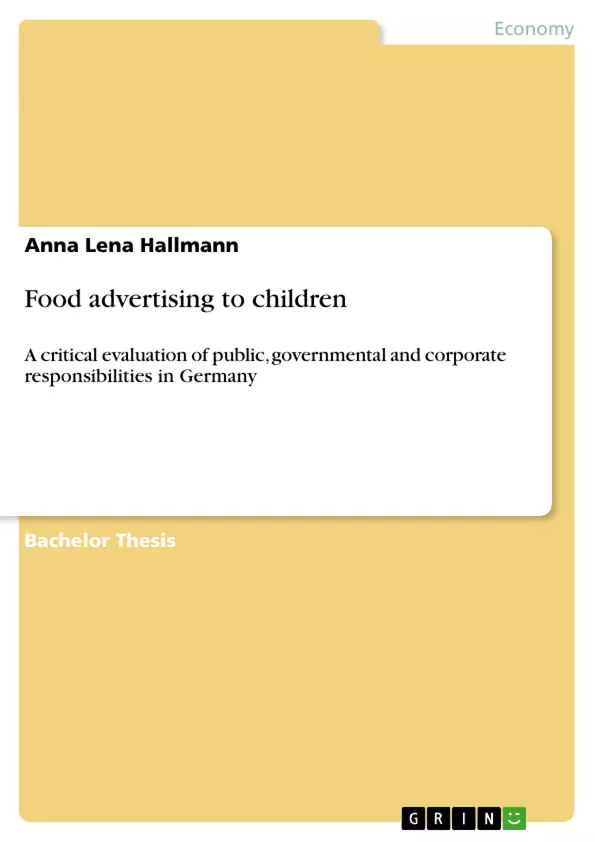With increasing levels of child obesity, the food industry and its advertising techniques are ever more in the centre of public and academic discussion. While such discussion is complicated by the subjectivity of ethical understanding, the existing body of research also lacks evidence for the actual effects of child-directed advertising. In order to advance a solution in the persisting conflict, this paper critically examines public, governmental and corporate responsibilities. A reflection of theoretical and empirical research is therefore complemented by the collection of primary data – drawn from qualitative interviews with children and their parents. As means of implications for practice, the author drafts an organisational concept for the responsible use and creation of children’s food advertising.
Inhaltsverzeichnis (Table of Contents)
- 1. Introduction
- 2. The status quo of food advertising to children in Germany
- 2.1 Advertising to children as reflected by theoretical and empirical research
- 2.1.1 Ethical considerations
- 2.1.2 Food advertising to children and its potential effects
- 2.1.3 Influences on advertising's effects on children
- 2.2 Advertising regulation
- 2.2.1 Legal regulation
- 2.2.2 Self-disciplinary regulation
- 3. Children's responses to food advertising and the parental influence
- 3.1 Research questions
- 3.2 Design and implementation of research
- 3.3 Findings
- 3.3.1 Effects of persuasive tactics on advertising-literate children
- 3.3.2 Children's assumptions about the nutritional value of non-core food
- 3.3.3 Parents' attitudes towards child-directed food advertising and their influence on children's responses
- 3.4 Limitations of research design
- 4. An approach towards the responsible use and creation of food advertising to children
- 4.1 Practical implications of research findings
- 4.2 Mission Statement: „Initiative für gesunden Umgang mit Lebensmittelwerbung für Kinder“
- 5. Conclusions for future research
Zielsetzung und Themenschwerpunkte (Objectives and Key Themes)
This thesis critically evaluates the role of public, governmental, and corporate responsibilities in addressing the growing issue of childhood obesity related to food advertising in Germany. It aims to bridge the gap between theoretical and empirical research on the effects of food advertising on children, incorporating primary data from qualitative interviews with children and their parents.
- Ethical considerations surrounding food advertising directed at children.
- The potential effects of food advertising on children's food choices and consumption habits.
- The impact of advertising regulation, both legal and self-disciplinary, on food advertising practices in Germany.
- Children's responses to food advertising and the influence of parental attitudes.
- Developing an organizational concept for the responsible use and creation of children's food advertising.
Zusammenfassung der Kapitel (Chapter Summaries)
Chapter 1 introduces the research topic and outlines the objectives of the study. Chapter 2 examines the current state of food advertising to children in Germany, reviewing existing theoretical and empirical research. This includes exploring ethical considerations, potential effects of advertising on children, and factors influencing its impact. It also analyzes legal and self-disciplinary regulations surrounding food advertising in Germany. Chapter 3 presents the findings of qualitative research conducted with children and their parents, focusing on their responses to food advertising and the role of parental influence. Chapter 4 explores practical implications of the research findings and proposes a mission statement for an initiative aimed at promoting responsible food advertising to children. Chapter 5 concludes with recommendations for future research.
Schlüsselwörter (Keywords)
This thesis delves into the crucial area of food advertising aimed at children, examining ethical concerns, potential effects, and regulatory frameworks. It analyzes the interplay between children, parents, and advertising tactics within the German context, advocating for responsible practices and fostering healthier choices for young consumers. Key themes include child obesity, ethical considerations in advertising, consumer behavior, advertising regulation, self-regulation, qualitative research, and responsible marketing.
Frequently Asked Questions
How does food advertising contribute to childhood obesity?
Research suggests that advertising for non-core (unhealthy) foods influences children's food preferences and consumption habits, often leading to increased intake of high-calorie, low-nutrient products.
What are the ethical concerns regarding advertising directed at children?
Ethical concerns arise because children may lack the cognitive ability to distinguish between entertainment and persuasive intent. This raises questions about the fairness of using sophisticated marketing tactics on a vulnerable audience.
How is food advertising to children regulated in Germany?
Regulation in Germany consists of a mix of legal requirements and self-disciplinary codes of conduct by the industry. The effectiveness of these self-regulatory measures is a subject of ongoing debate.
What role do parents play in mitigating advertising's effects?
Parents' attitudes and their level of "advertising literacy" significantly influence how children respond to ads. Parental mediation can help children understand and critically evaluate marketing messages.
What is "advertising literacy" in children?
Advertising literacy refers to a child's ability to recognize an advertisement and understand its persuasive intent. However, even "literate" children can still be influenced by emotional and sensory persuasive tactics.
What is the "Initiative for Healthy Handling of Food Advertising for Children"?
It is a proposed mission statement and organizational concept drafted to promote the responsible use and creation of children’s food advertising, involving public and corporate responsibilities.
- Quote paper
- Anna Lena Hallmann (Author), 2012, Food advertising to children, Munich, GRIN Verlag, https://www.grin.com/document/263241



